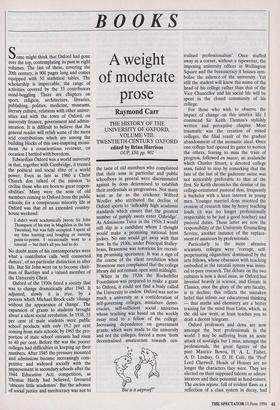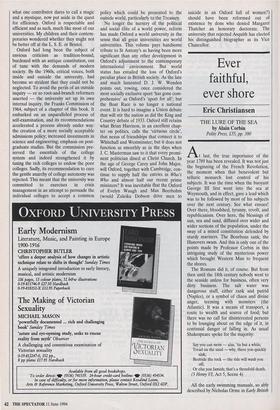BOOKS
A weight of moderate prose
Raymond Carr
THE HISTORY OF THE UNIVERSITY OF OXFORD, VOLUME VIII: TWENTIETH-CENTURY OXFORD edited by Brian Harrison OUP, L50, pp. 902 Some might think that Oxford had gone over the top, contemplating its past in eight volumes. The last of these, covering the 20th century, is 900 pages long and comes equipped with 50 statistical tables. The scholarship is impeccable, the range of activities covered by the 33 contributors mind-boggling. There are chapters on sport, religion, architecture, libraries, publishing, politics, medicine, museums, literary culture, relations with other univer- sities and with the town of Oxford, on university finance, government and admin- istration. It is difficult to believe that the general reader will relish some of the more arid contributions which are among the building blocks of this awe-inspiring monu- ment. As a conscientious reviewer, on occasion I battled with boredom.
Edwardian Oxford was a world university in that, together with Cambridge, it trained the political and social elite of a world power. Even as late as 1960 a Christ Church don talked of the mission 'to civilise those who are born to great respon- sibilities'. Many were the sons of old members coming to Oxford from the public schools; for a conspicuous minority life at Oxford was that of an extended country- house weekend: I didn't work academically [wrote Sir John Thompson of his stay in Magdalen in the late Twenties], but was fully occupied. I spent all my time hunting and beagling or running point-to-points. I occasionally went to a tutorial — but that's all you had to do.
No doubt many of his contemporaries were what a contributor calls 'well connected dunces', of no particular distinction in after life. But Sir John went on to become chair- man of Barclays and a valued member of the University Chest.
Oxford of the 1930s fitted a society that was to change dramatically after 1945. It adjusted, slowly it is true, by a process which Michael Brock calls 'change without the appearance of change'. The expansion of grants to students brought about a silent social revolution. In 1938, 55 per cent of male students were public school products with only 19.2 per cent coming from state schools; by 1965 the pro- portion of state school entrants had risen to 40 per cent. Before the war the poorer colleges had difficulties in keeping up their numbers. After 1945 the pressure mounted and admissions became increasingly com- petitive and widened socially with the improvement in secondary schools after the 1944 Education Act; competition, as Thomas Hardy had believed, favoured `obscure little academies'. But the advance of social justice and meritocracy was not to the taste of old members who complained that their sons in particular and public schoolboys in general were discriminated against by dons determined to establish their credentials as progressives. Not many went as far as the cricketer Wilfred Wooller who attributed the decline of Oxford sports to 'inflexibly high academic standards which ensure that the greatest number of pimply swots enter Oxbridge'. As Admissions Tutor in the 1950s I would still slip in a candidate whom I thought would make a promising national hunt jockey. No one would get away with that now. In the 1930s, under Principal Stalley- brass, Brasenose was notorious for recruit- ing promising sportsmen. It was a sign of the course of the silent revolution when Brasenose men complained that the college library did not remain open until midnight. When in the 1920s the Rockefeller Foundation was prepared to make a grant to Oxford, it could not find a body called the University to endow. Oxford was not so much a university as a confederation of self-governing colleges, miniature demo- cracies, self-sufficient social universes whose teaching was based on the weekly essay read to a fellow of the college. Increasing dependence on government grants, which were made to the university and not the colleges, forced a move 'from decentralised amateurism towards cen- But is it airproof?' tralised professionalism'. Once stuffed away in a corner, without a typewriter, the imposing university offices in Wellington Square and the bureaucracy it houses sym- bolise the salience of the university. Yet still the student will know the name of the head of his college rather than that of the Vice Chancellor and his social life will be spent in the closed community of his college.
For those who wish to observe the impact of change on this interior life I commend Sir Keith Thomas's stylishly written and perceptive chapter. Most traumatic was the creation of mixed colleges, the filial result of the gradual abandonment of the monastic ideal. Once one college had opened its gates to women the others, fearing to miss the train of progress, followed en masse, an avalanche which Charles Stuart, a devoted college man, failed to stop by remarking that the fate of the last of the gaderene swine was not noticeably preferable to that of the first. Sir Keith chronicles the demise of the college-orientated pastoral don, frequently a bachelor with a keen interest in young men. Younger married dons resented the erosion of research time by heavy teaching loads (it was no longer professionally respectable to be just a good teacher) and pastoral duties. These latter are now the responsibility of the University Counselling Service, another instance of the replace- ment of amateurs by professionals.
Particularly to the more abrasive scientists, colleges were 'corrupt, self- perpetuating oligarchies' dominated by the arts fellows, whose obsession with teaching embodied in the tutorial system was inimi- cal to pure research. The debate on the two cultures is now a dead issue, as Oxford has invested heavily in science, and Greats in Classics, once the glory of the arts faculty, is in decline; this reflects the mistaken belief that infests our educational thinking — that maths and chemistry are a better training for the mind than Latin, which, as the old saw went, at least teaches you to draft a decent telegram.
Oxford professors and dons are now amongst the best professionals in the world. I may be suffering from an acute attack of nostalgia but I miss, amongst the professionals, the great figures of the past: Maurice Bowra, H. A. L. Fisher, A. D. Lindsay, G. D. H. Cole, the 'Prof Lord Cherwell. Heads of Houses are no longer the characters they were. They are elected on their supposed talents as admin- istrators and their potential as fund-raisers. The ancien regime, full of evident flaws as a reflection of a class system in decay, had what one contributor dares to call a magic and a mystique, now put aside in the quest for efficiency. Oxford is respectable and efficient and as such, much like most of our universities. My children and their contem- poraries wondered whether they might not be better off at the L. S. E. or Bristol.
Oxford had long been the subject of envious criticism as tradition-bound, burdened with an antique constitution, out of tune with the demands of modern society. By the 1960s, critical voices, both inside and outside the university, had become so strident that they could not be neglected. To avoid the perils of an outside inquiry — or so root-and-branch reformers asserted — the university set up its own internal inquiry, the Franks Commission of 1964, subject of a chapter of this book. It embarked on an unparalleled process of self-examination, and its recommendations accelerated a process already under way: the creation of a more socially acceptable admissions policy; increased investments in science and engineering; emphasis on post- graduate studies. But the commission pre- served the essentials of the college system and indeed strengthened it by taxing the rich colleges to endow the poor colleges. Sadly, its recommendation to cure the gentle anarchy of college autonomy was rejected. This meant that the university was committed to exercises in crisis management in an attempt to persuade the individual colleges to accept a common policy which could be presented to the outside world, particularly to the Treasury.
No longer the nursery of the political and social elite of a world power, reform has made Oxford a world university in the sense that all great universities are world universities. This volume pays handsome tribute to St Antony's as having been more significant than any other development in Oxford's adjustment to the contemporary international environment. But world status has entailed the loss of Oxford's peculiar place in British society. As the late and much lamented D. J. W. Wenden points out, rowing, once considered the most socially exclusive sport 'has gone com- prehensive' as Oxford's 'sport for all'; but the Boat Race is no longer a national event. It is hard to imagine a Union debate that will stir the nation as did the King and Country debate of 1933. Oxford still retains what Brian Harrison, in an excellent chap- ter on politics, calls the 'virtuous circle', that nexus of friendships that connect it to Whitehall and Westminster; but it does not function as smoothly as in the days when J. C. Masterman saw to it that every promi- nent politician dined at Christ Church. In the age of George Carey and John Major, will Oxford, together with Cambridge, con- tinue to supply half the entries in Who's Who and almost half our recent prime ministers? It was inevitable That the Oxford of Evelyn Waugh and Max Beerbohm (would Zuleika Dobson drive men to suicide in an Oxford full of women?) should have been reformed out of existence by dons who denied Margaret Thatcher an honorary doctorate. The university that rejected Asquith has elected his distinguished biographer as its Vice Chancellor.



































































 Previous page
Previous page